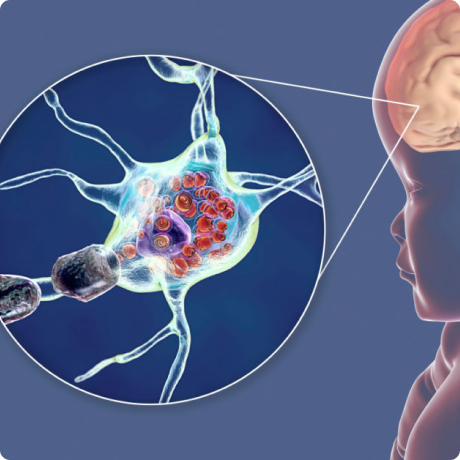Niemann-Pick Disease Type C (NPC) is a rare, inherited lysosomal storage disorder caused by the body’s inability to transport cholesterol and other lipids within cells. This dysfunction leads to the accumulation of these substances in various body tissues, notably the brain, causing cellular and tissue damage. NPC manifests with a wide range of neurological, systemic, and psychiatric symptoms, significantly impacting quality of life and life expectancy.1


NPC affects males and females in equal numbers, and can affect individuals of any ethnic background (pan ethnic). NPC is estimated to occur in 1 in 100,000-120,000 live births. Due to its variable symptoms and late onset in some individuals, NPC is likely underdiagnosed, suggesting the actual number of affected individuals could be higher.2
Difficulty with voluntary movements and balance. Sudden, uncontrolled electrical disturbances in the brain. Involuntary, rhythmic muscle contractions leading to shaking movements in one or more parts of the body.
Challenges in acquiring knowledge and skills to the level expected of those of the same age,
particularly in school-aged children.Progressive loss of cognitive functions, including memory,
problem-solving, and attention.
An increase in size of the liver and/or spleen due to lipid accumulation, which can lead to abdominal swelling and discomfort.
Challenges in breathing that may include shortness of breath, rapid breathing, or a chronic cough, potentially leading to recurrent respiratory infections.
Difficulty with voluntary movements and balance. Sudden, uncontrolled electrical disturbances in the brain. Involuntary, rhythmic muscle contractions leading to shaking movements in one or more parts of the body.
Challenges in acquiring knowledge and skills to the level expected of those of the same age, particularly in school-aged children.Progressive loss of cognitive functions, including memory, problem-solving, and attention.
An increase in size of the liver and/or spleen due to lipid accumulation, which can lead to abdominal swelling and discomfort.
Challenges in breathing that may include shortness of breath, rapid breathing, or a chronic cough, potentially leading to recurrent respiratory infections.
Difficulty with voluntary movements and balance. Sudden, uncontrolled electrical disturbances in the brain. Involuntary, rhythmic muscle contractions leading to shaking movements in one or more parts of the body.
Challenges in acquiring knowledge and skills to the level expected of those of the same age, particularly in school-aged children. Progressive loss of cognitive functions, including memory, problem-solving, and attention.
An increase in size of the liver and/or spleen due to lipid accumulation, which can lead to abdominal swelling and discomfort.
Challenges in breathing that may include shortness of breath, rapid breathing, or a chronic cough, potentially leading to recurrent respiratory infections.
Difficulty with voluntary movements and balance. Sudden, uncontrolled electrical disturbances in the brain. Involuntary, rhythmic muscle contractions leading to shaking movements in one or more parts of the body.
Challenges in acquiring knowledge and skills to the level expected of those of the same age, particularly in school-aged children. Progressive loss of cognitive functions, including memory, problem-solving, and attention.
An increase in size of the liver and/or spleen due to lipid accumulation, which can lead to abdominal swelling and discomfort.
Challenges in breathing that may include shortness of breath, rapid breathing, or a chronic cough, potentially leading to recurrent respiratory infections.
Difficulty with voluntary movements and balance. Sudden, uncontrolled electrical disturbances in the brain. Involuntary, rhythmic muscle contractions leading to shaking movements in one or more parts of the body.
Challenges in acquiring knowledge and skills to the level expected of those of the same age, particularly in school-aged children. Progressive loss of cognitive functions, including memory, problem-solving, and attention.
An increase in size of the liver and/or spleen due to lipid accumulation, which can lead to abdominal swelling and discomfort.
Challenges in breathing that may include shortness of breath, rapid breathing, or a chronic cough, potentially leading to recurrent respiratory infections.

NPC is caused by mutations in either the NPC1 or NPC2 genes, which are crucial for the normal transport of cholesterol and lipids within cells. The mutations lead to defective or insufficient protein function, causing lipid accumulation. The disease is inherited in an autosomal recessive pattern, meaning an individual must inherit two mutated genes, one from each parent, to develop the condition.
NPSuisse: https://www.npsuisse.ch/en/
Orphanet : https://www.orpha.net/en/disease/detail/646
1. Bajwa H, Azhar W. Niemann-Pick Disease. [Updated 2023 Mar 6]. In: StatPearls [Internet]. Treasure Island (FL): StatPearls Publishing; 2024 Jan-. Available from: https://www.ncbi.nlm.nih.gov/books/NBK556129/
2. https://rarediseases.org/rare-diseases/niemann-pick-disease-type-c/#affected